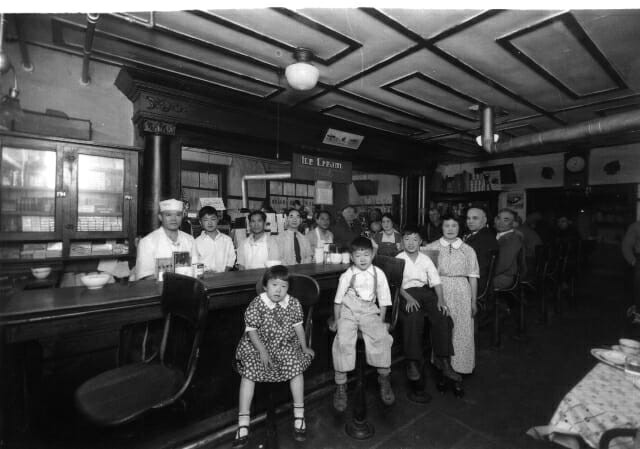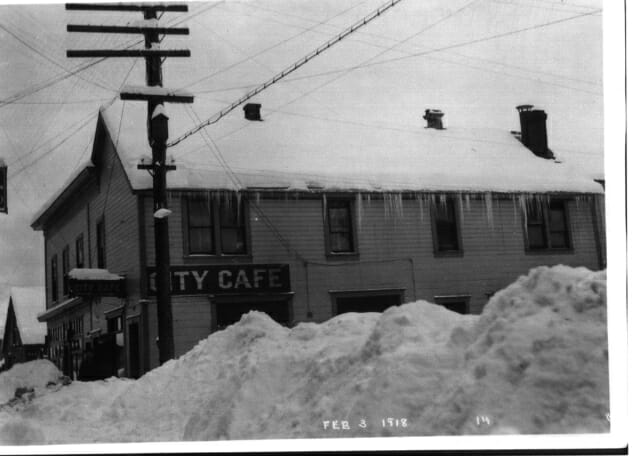Gastineau Channel Memories
Tanaka, Shonosuke and Nobu
Alice Tanaka Hikido
Shonosuke Tanaka owned and operated the City Cafe in Juneau for about 50 years, and was one of the first Japanese pioneers of Juneau. He was born in 1881, in a small rural village in Fukuoka Province in southern Japan. When he was a young man, his family, who were rice farmers, suffered a widespread crop failure, which motivated him to try his fortunes in America. He emigrated to America in 1900, and along with many other Japanese laborers, worked on the railroad from Montana to Washington. After finishing his contract, he worked as a kitchen helper for a family in Seattle while attending English classes at night. It was at this time that he gained skills that would be the means of his livelihood. His adventuresome spirit led him north to Cordova, Alaska, where the nearby Kennicott Copper Mine was the mainstay of the area. It was here that he started his first cafe. When the mine declined, he decided to move to Juneau to try his luck there.
About 1907, he opened a cafe on Front Street called the Star Cafe. By 1912, he moved to the southern end of Front Street, later to be called South Franklin Street, and started the City Cafe in a building leased from Ole Orsen. The City Cafe, which was open 24 hours a day, seven days a week, was basically a ?workingman?s restaurant? which served hearty meals at reasonable prices. The menu ranged from traditional items such as sourdough pancakes and halibut cheeks to Chinese dishes such as chow mein and sweet and sour spareribs. Among the regular customers were the miners, longshoremen, mill workers, fishermen and Natives that gave distinction to this area. Adding to the character of South Franklin Street was the red light district and the numerous saloons. In many ways, South Franklin Street was the essence of the ?last frontier,? and the City Cafe was the focal place where people could gather and experience community. Tanaka, as he was called by customers and friends, had a reputation for helping many who were ?down and out.? When the longshoremen went on a long strike in the 30?s, many meals were put on the tab.
In 1922, Shonosuke went back to Japan, and as was the Japanese custom, his marriage to Nobu Fujita was arranged by their families. Shortly after, they returned together to Juneau and made their home on Carroll Way, which was located between Gastineau Avenue and South Franklin Street. The hillside behind the house was terraced and cultivated, and a bountiful garden of flowers and vegetables were created by Nobu. They had five children, John, William, Teddy, Alice and Mary. As the children grew older, they were given responsibilities from peeling tubs of potatoes to washing dishes and waiting on tables at the City Cafe. This work ethic was strongly instilled by Shonosuke who put in long hours of labor. In the summer of 1939, a tragedy befell the family when Teddy, at the age of nine, suddenly disappeared. The townspeople gave support by searching the mountain areas and waters by the City Dock, but to no avail. He was presumed to have drowned and his body taken out to sea. This misfortune left a deep sorrow in the family.
The outbreak of World War II in December 1941, dramatically changed the destiny of the Tanaka family. Because of their Japanese ancestry, Shonosuke Tanaka and other Japan-born men were arrested by the U.S. Marshal?s office without due process. Local friends and business people, such as John Hermle, Cash Cole and J.F. Mullen testified of his loyalty to America on Shonosuke?s behalf, but it made no difference. He, along with the other Japanese men were sent to an internment camp in Santa Fe, New Mexico, in early 1942. Nobu and the children were informed that they would also experience a similar fate at a later date. They were instructed to close their affairs as soon as possible. John, a senior in high school, who was to be the valedictorian of his class, took on the responsibility of closing the City Cafe. He was assisted in legal matters by Mike Monagle, a Juneau attorney. In April 1942, the remainder of the family was shipped out and later settled in Minidoka Internment Camp, at Hunt, Idaho. In 1944, Shonosuke was allowed to leave Santa Fe to join his family in Minidoka. By this time, John was serving in the Army in Italy with the 442nd Infantry Unit composed of Japanese-Americans, and Bill was allowed to leave the camp to work in Chicago since returning to the West Coast was still prohibited. With the ending of the war in 1945, Shonosuke and Nobu, with Mary and Alice, were able to leave Minidoka Camp and return to Juneau. The Tanner family who for many years operated the Scandinavian Rooms and Steam Bath across from the City Cafe, met the ship that brought the Tanakas back to Juneau and extended their hospitality until they were able to move back to their home on Carrol Way.
Shonosuke, who was now 64 years, was challenged to pick up the pieces of the years lost by the war. He received a loan from the B.M. Behrends Bank and was able to regain the lease to the building that was the City Cafe for many years. Their son Bill returned to Juneau from Chicago to help in the preparation for reopening the business. The Alaska-Juneau Mine was closed during the war and other changes occurred, but when the City Cafe opened its doors again in 1946, many of the regular customers returned. John Hermle, who owned the Home Grocery, extended credit for several months before any payments were possible. (Years later when Alice and Mary returned to Juneau, they were able to visit with John Hermle and at that time expressed their appreciation to John. His reply was, ?Many years ago when I was a young man and wanted to start my own store, your father encouraged me. He and Gus Messerschmidt co-signed a loan for me, and I have never forgotten that.?) When John Tanaka was discharged from the Army, he returned to Juneau and helped his brother and father in the effort to get the City Caf? back on its feet.
By 1950, the City Caf? was again a thriving business and at this time Sam Taguchi and K. Komatsubara joined Shonosuke Tanaka as partners. Laws that denied citizenship to Japanese immigrants were repealed, and in 1954, Shonosuke and Nobu became naturalized citizens of the United States. While their children left Juneau to pursue professions in medicine, business, and education, Shonosuke and Nobu, who gave them the example of determination and hard work, continued to live in Juneau for the rest of their lives.
Shonosuke passed away in 1957, and is buried in Evergreen Cemetery in Juneau. Nobu passed away in 1967, and is buried in Evergreen-Washelli Cemetery in Seattle. Shonosuke and Nobu Tanaka made Juneau their home to start a business and raise a family during difficult and rewarding times.
 |
John Shonosuko, Alice, Teddy, William and Nolan. |
 |
City Cafe, 1918. |
